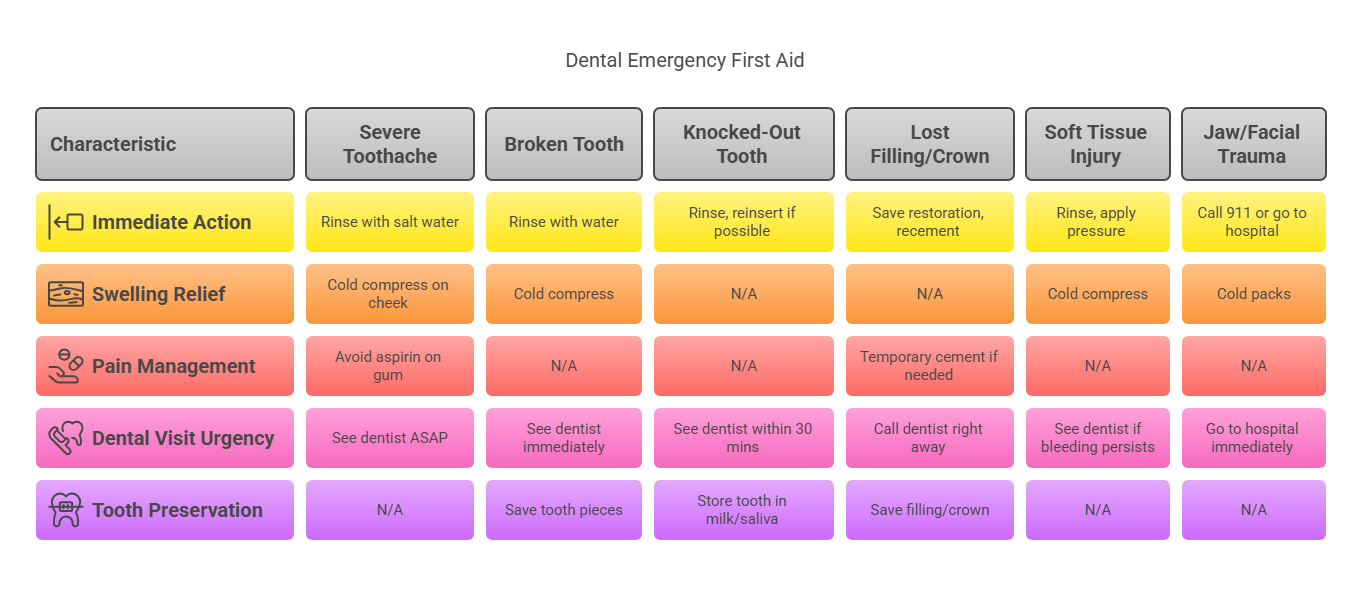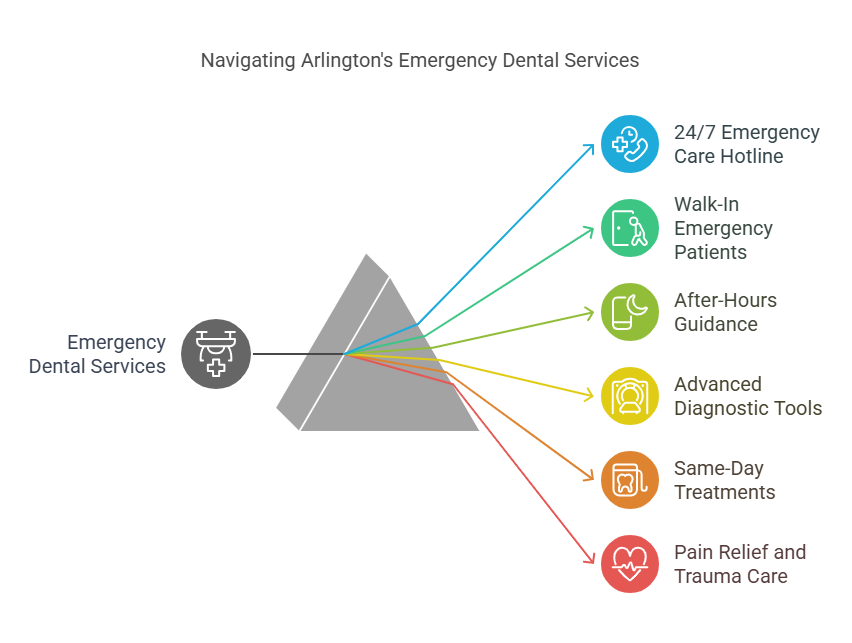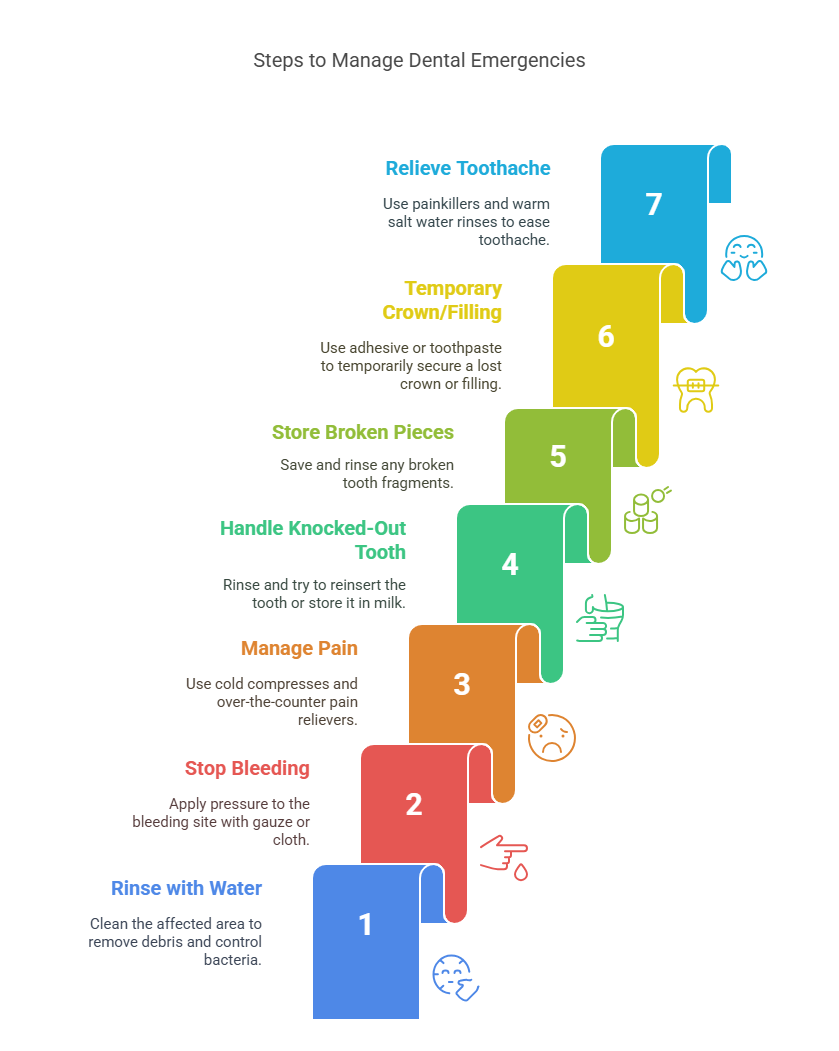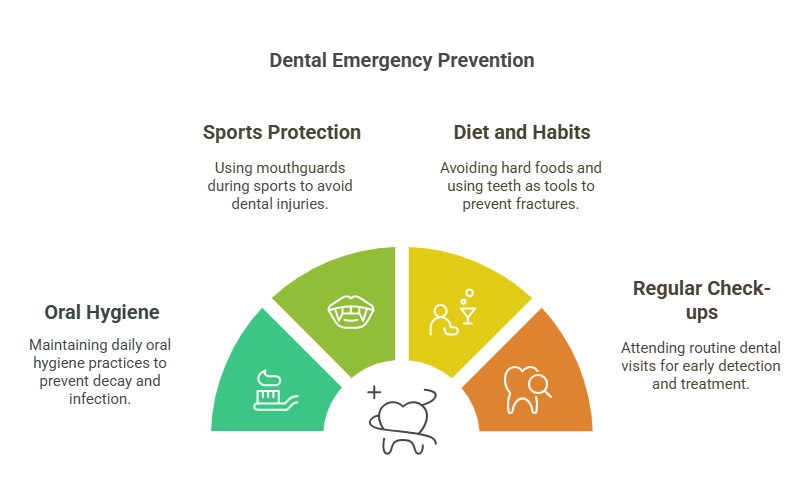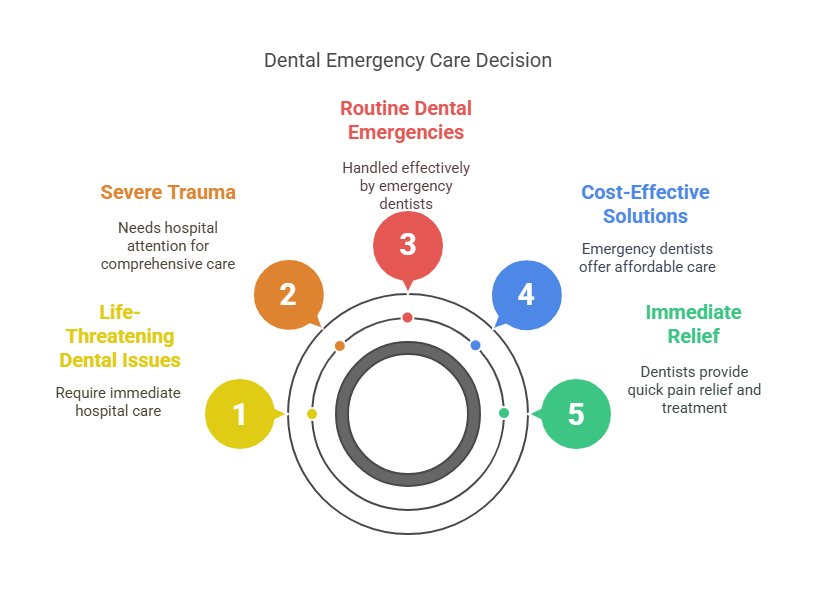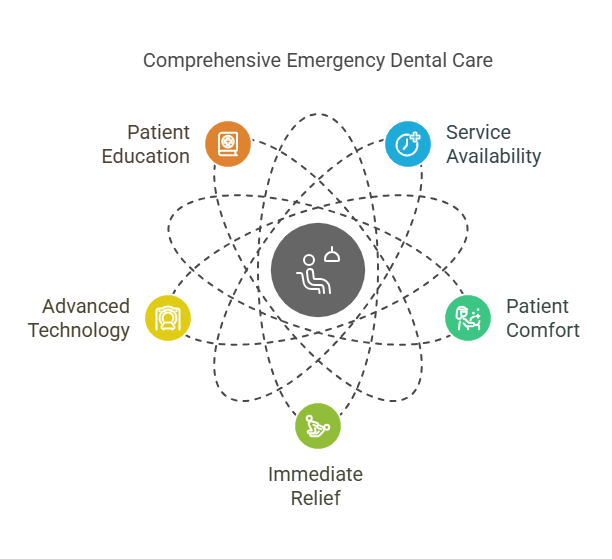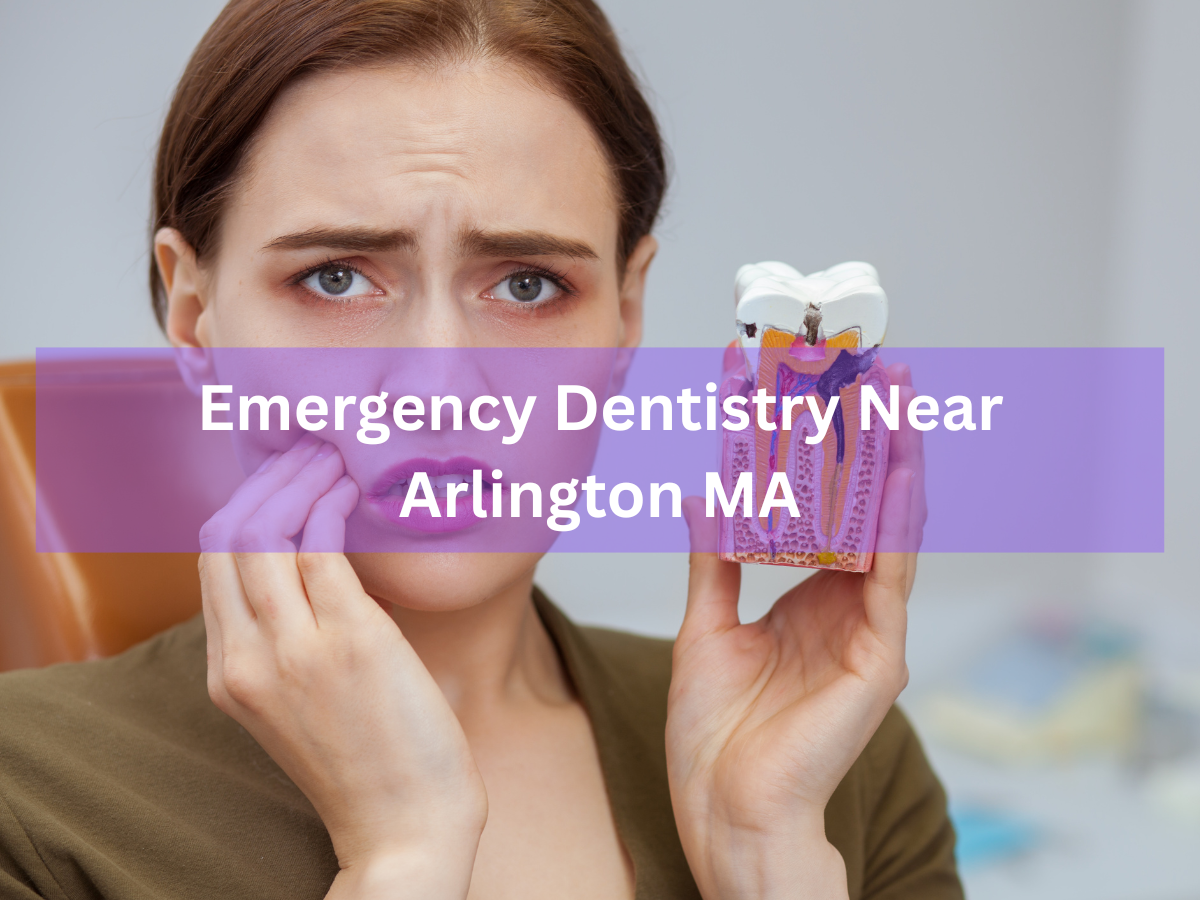
When a sudden toothache or dental injury strikes, you need prompt, professional care. Arlington, MA residents can count on experienced emergency dentists to handle urgent dental problems anytime. Emergency dentistry addresses severe pain, broken or knocked-out teeth, lost crowns and fillings, abscesses, and other issues that require immediate attention. In fact, more than one in five Americans report recent orofacial pain and nearly 12% have suffered a toothache in just six months. Dental problems can quickly disrupt your day – and your life – so knowing when and where to get help is critical. In Arlington, our dental team is available 24/7 by phone and welcomes walk-in emergencies during office hours to give you relief and treatment right away.
For many people, the first question is “what counts as a dental emergency?” Generally, any problem that causes severe pain, swelling, or risk of infection is an emergency. If you have intense, persistent tooth pain, a tooth that has been chipped, cracked, or completely knocked out, a lost filling or crown, visible abscess (boil) on the gums, or uncontrollable bleeding or jaw injury, you should seek care immediately. Arlington dentists define a dental emergency as “anything that causes discomfort, trouble chewing or talking, or more intense pain”. These situations can make it hard to eat, sleep or work, so prompt treatment can prevent complications and get you back to normal.
Common Dental Emergencies
-
Severe Toothache or Swelling: A constant, throbbing toothache – especially if accompanied by facial swelling or fever – often signals an infection (abscess). You should rinse your mouth with warm salt water, gently floss around the painful tooth, and apply a cold compress outside your cheek to reduce swelling. Do not place aspirin on the gum, as it can burn the tissue. Call the dentist as soon as possible; a painful abscess needs antibiotics or drainage right away.
-
Broken, Cracked or Fractured Tooth: A chipped or fractured tooth may look minor, but it can expose nerves and lead to infection. Keep the area clean and rinse with warm water, then apply a cold compress to reduce swelling. If the break is large or painful, see a dentist immediately to avoid further damage. Save any pieces of the tooth and bring them with you.
-
Knocked-Out (Avulsed) Tooth: Time is critical if a tooth is completely dislodged. Gently rinse the tooth with water (without scrubbing) and, if possible, reinsert it into the socket by hand, holding it in place until you can get to the dentist. If that isn’t possible, store the tooth in a glass of milk or your saliva – keeping it moist greatly improves the chance of saving it. See the dentist within 30 minutes for the best outcome.
-
Lost Filling or Crown: A missing filling or crown can expose the sensitive inner tooth. Save the restoration (crown or filling) if you can, and call the dentist right away. You may be able to temporarily re-cement it with denture cream (or even a bit of toothpaste) to protect the tooth until the dentist can see you. If the tooth is exposed or sharp, cover it with sugar-free gum or wax to prevent cutting your tongue.
-
Soft Tissue Injury: Cuts and lacerations to the lips, tongue or cheeks can bleed heavily. Rinse the area with clean water and apply firm pressure with gauze for 10–15 minutes to stop bleeding. Use a cold compress on the outside of your lip or face to reduce pain and swelling. Severe cuts may require stitches, so go to your dentist or an emergency room if bleeding does not stop.
-
Jaw or Facial Trauma: If an injury has damaged your jaw or is causing heavy bleeding, it is beyond the scope of dental care. In those cases, call 911 or go to the hospital immediately. Otherwise, for jaw or dental trauma, apply cold packs and see your dentist as soon as possible.
In any of the above scenarios, it’s better to call or visit the dentist than to wait. Dental pain and infections can escalate rapidly. Arlington dentists encourage you to err on the side of caution – if in doubt, make an emergency appointment. Our practice gives priority to urgent cases and will make sure new and existing patients are seen immediately when a serious problem arises.
Arlington Emergency Dental Care Services
Arlington Dental Associates provides comprehensive emergency dentistry services right here in town. We have a dedicated Emergency Care Hotline that is available 24 hours a day, 7 days a week. You can call our office anytime – day or night – and our answering service will connect you with on-call staff or provide instructions. During business hours, we welcome walk-in emergency patients at 43 Broadway, Arlington. Even without an appointment, you can “stop by our office for an evaluation” if you are experiencing urgent pain. If you arrive outside normal hours, simply call our after-hours line (781) 641-0500 to receive immediate guidance.
Arlington Dental’s emergency care team is prepared to handle all the situations listed above. We have the latest digital X-rays and diagnostic tools to identify hidden damage or infections, and can provide treatments on the same day. This may include temporary fillings or crowns, root canal therapy for infected teeth, sutures for soft tissue injuries, and antibiotics to control pain and infection. We also carry emergency supplies like temporary filling material and dental cement to stabilize broken teeth and loose crowns until permanent repair.
Dr. Robert Page and our team are specialists in pain relief and trauma care. We accept new patients for emergency visits and have treated thousands of local residents for toothaches and injuries. In fact, Dental Associates of Arlington emphasizes that “broken or knocked-out teeth, missing fillings or crowns, intense facial pain or infections, and even TMJ issues (lockjaw) are all reasons people seek emergency dental care”. We work swiftly to eliminate pain and prevent complications. If you’ve experienced dental trauma or severe tooth pain in Arlington, we’ll see you the same day and take the stress out of the situation.
First Aid Tips for Dental Emergencies
If you have to wait even a short while for dental treatment, here are some important first-aid steps you can take in the meantime:
-
Rinse with water. For any mouth injury or toothache, start by rinsing gently with warm water to clean debris. This helps control bacteria in cuts or around a painful tooth.
-
Stop bleeding. If the site is bleeding, press clean gauze or a soft cloth firmly on it for 10–15 minutes. If bleeding persists or is heavy, keep applying pressure or seek emergency medical care.
-
Manage pain and swelling. Apply a cold compress (ice pack wrapped in cloth) to your cheek for 10 minutes on and 10 minutes off. This reduces swelling and numbs pain. Over-the-counter pain relievers (acetaminophen or ibuprofen) can ease discomfort. Do not place aspirin on a tooth or gum, which can cause burns.
-
Handle a knocked-out tooth. Carefully pick up the tooth by the crown (the chewing end), not the root. If it’s dirty, gently rinse with water. Try to reinsert the tooth into its socket, holding it in place with a clean cloth or gauze. If that’s not possible, put the tooth in a container with milk, saline solution or your saliva to keep it moist. Bring the tooth to your appointment, and we will attempt to save it.
-
Store broken pieces. If a tooth breaks, save any fragments and rinse them in water. You may be able to use them for bonding. In the interim, stick a piece of sugar-free gum or dental wax over any sharp edges to protect your cheek or tongue.
-
Temporary lost crown or filling. Apply a small dab of dental adhesive or even toothpaste on the inside of the crown and try to seat it back on the tooth as a temporary measure. This can reduce sensitivity. Bring the crown or filling to your visit so it can be permanently re-cemented.
-
Relieve toothache at home. If a filling is lost or a cavity is causing pain, take an over-the-counter painkiller and avoid very hot or cold foods. Rinse with warm salt water every few hours. Sometimes gently flossing to dislodge trapped food can relieve pain.
These simple actions can help manage your condition and reduce the risk of complications until you reach our office. But remember, these are only temporary measures. They do not replace professional treatment. You should still see a dentist as quickly as possible for definitive care. For important guidelines and tips on handling dental emergencies, visit the American Dental Association’s emergency treatment resource, which provides essential information for immediate care.
Preventing Dental Emergencies
While not every emergency can be avoided, many problems can be prevented with good habits:
-
Maintain excellent oral hygiene. Brush twice daily with fluoride toothpaste, floss nightly, and use mouthwash as directed. This helps prevent decay and gum infection, which are common causes of urgent problems.
-
Wear a mouthguard for sports. If you play contact sports or vigorous recreational activities, protect your teeth with a custom mouthguard. This can prevent chipped, cracked or knocked-out teeth.
-
Avoid hard foods and habits. Don’t chew ice, hard candy, or non-food items (like pens). Don’t use your teeth as tools to open packaging or bottles. These actions can fracture teeth or damage dental work.
-
Regular dental check-ups. See your dentist every 6 months (or as recommended) for cleanings and exams. Early detection of cavities or weak teeth can let us fix issues before they become emergencies.
By taking preventive steps and attending routine care, you greatly reduce the risk of painful surprises. However, when accidents happen or pain flares up despite your best efforts, rest assured that emergency dental help is nearby in Arlington.
Dental Emergency vs. Emergency Room
Not all tooth problems belong in the hospital emergency room. Emergency dentists handle most urgent dental issues directly, often much more quickly and affordably. ER doctors typically do not provide dentistry beyond pain meds. Go to the ER only if your dental issue is life-threatening or involves severe trauma beyond the mouth. For example, uncontrollable bleeding, jaw fractures, facial swelling affecting breathing, or swallowing fluids that could be life-threatening require 911 or hospital care. For routine dental emergencies (tooth pain, broken teeth, lost fillings, mild swelling), an emergency dentist is the appropriate choice. We can diagnose and treat the problem at its source, often the same day.
Choosing an emergency dentist also means lower costs. Hospitals often charge for triage and x-rays without definitive dental treatment. In contrast, we focus on fixing the dental issue itself: we might simply numb your mouth and restore the tooth or prescribe antibiotics. We coordinate with your insurance (if any) just like a regular dental visit. Many plans cover emergency visits under the same benefits as regular care. In urgent need, call us first – our team is ready to quickly relieve your pain and fix your dental problem.
Local 24/7 Emergency Dentistry in Arlington
Arlington Dental Associates is proud to serve the local community with round-the-clock emergency dental services. Our office at 43 Broadway is equipped to welcome you on very short notice. We frequently help families and workers in Arlington Center, East Arlington, Arlington Heights, and nearby cities like Belmont, Cambridge and Medford. Whether your emergency occurs during weekday evenings, weekends, or even holidays, our emergency line will ensure you know exactly how to get care.
We also coordinate care for patients with special needs or severe anxiety. Sedation options are available if you feel nervous about emergency treatment. Whatever your situation, your safety and comfort come first. You can rely on our experienced team to make urgent dental care as stress-free as possible.
When you call us for an emergency, here’s what will happen: We’ll ask about your symptoms and suggest immediate relief strategies. If it’s very serious, we may recommend heading straight to the ER. Otherwise, we’ll schedule you for an emergency exam. At your appointment, we focus on stopping pain and infection – whether that means placing a temporary filling, performing a root canal, or extracting a non-salvageable tooth. Our goal is to stabilize you that day, then arrange any definitive follow-up care (crowns, implants, etc.) once the emergency has passed.
Throughout your visit, we use advanced technology (digital X-rays, intraoral cameras, etc.) so you can see what’s wrong in real time. We explain every step, answer your questions, and help you understand how to avoid future emergencies. Patients often tell us: “I feel so much better knowing I can get same-day care. The staff was kind and the doctor made me comfortable”. Our commitment is to provide emergency dental care with a compassionate, personal touch. You’ll leave our office pain-free and informed.
People Also Ask
Q1: What counts as a dental emergency?
A: A dental emergency includes any issue causing severe pain, swelling, or risk of infection. Examples are an intense, unrelenting toothache; a tooth that is broken, cracked or completely knocked out; a lost filling or crown; or an abscess (pimple) on the gums. Basically, if the problem interferes with eating, speaking or breathing comfortably, it’s an emergency. You should contact a dentist right away in these cases.
Q2: When should I see a dentist for an emergency?
A: You should see a dentist immediately if you experience any of the above problems. Even a minor chip can become serious if the nerve is exposed. Don’t wait it out: call the dentist and get an appointment as soon as possible. For example, a broken tooth should be evaluated quickly to prevent infection. Arlington emergency dentists offer same-day slots for urgent issues.
Q3: What should I do if a tooth gets knocked out?
A: If a tooth is completely knocked out (avulsed), handle it by the crown (top), not the root. Rinse it gently with water (do not scrub) and try to reinsert it into the socket. If that’s not possible, put the tooth in a container of milk or saliva to keep it moist. Then see your dentist within 30 minutes if you can – quick action offers the best chance of saving the tooth.
Q4: Is a severe toothache an emergency?
A: Yes – especially if it keeps you up at night or doesn’t improve with pain relievers. Severe pain often indicates an infected nerve or abscess, which can quickly spread. Rinse with warm salt water and take a pain reliever, but call your dentist immediately. Severe toothaches should be treated within hours to prevent complications.
Q5: Does Arlington Dental have a 24-hour emergency line?
A: Yes. Our practice provides an around-the-clock emergency hotline. You can call our office at any hour – nights, weekends or holidays – and follow the prompts to reach our on-call dentist. The answering service will connect you with the necessary care or instructions. This 24/7 line ensures that help is always available when Arlington patients need urgent dental assistance.
Q6: Can I get same-day emergency dental care in Arlington?
A: Absolutely. During regular hours, Arlington Dental accepts walk-in emergency patients – no appointment needed. If you arrive with acute pain, we will see you promptly for an evaluation. We keep space in the schedule for urgent cases so you don’t have to wait days. Even after hours, our emergency line will guide you to the next available care, often still within the same day.
Q7: What if I lose a filling or crown?
A: Losing a filling or crown can be painful and leave a tooth vulnerable. Treat it as an emergency. Save the crown or filling if you can. You may attempt to temporarily reattach it using toothpaste or denture adhesive. Then contact your dentist right away. Bringing the crown to your appointment is ideal – the dentist may be able to re-cement it. At the very least, we can place a temporary filling to protect the tooth until a permanent fix.
Q8: How can I relieve dental pain at home?
A: For temporary pain relief, rinse with warm salt water to clean the area and reduce inflammation. Use a cold compress on the cheek to numb pain and decrease swelling. Take over-the-counter pain medication (acetaminophen or ibuprofen) as directed. Avoid putting aspirin directly on your tooth or gum. These measures can help but do not replace dental care – you should still see a dentist as soon as possible.
Q9: Should I go to the emergency room or dentist?
A: Most dental emergencies are best treated by a dentist. A dental office can address tooth and gum problems directly. Go to the hospital ER only if the injury is life-threatening or involves serious trauma (like a fractured jaw or uncontrolled bleeding). For example, a badly lacerated tongue with incessant bleeding might need ER care. Otherwise, call your dentist for tooth pain or dental injury. Dentists and their teams are equipped to relieve pain and fix teeth on the spot.
Q10: What if my child has a dental emergency?
A: Children can also experience dental emergencies, and they require prompt attention. Many Arlington emergency dentists (including ours) see patients of all ages. Treat your child’s emergency just like your own: comfort them, apply first-aid (rinse, cold compress, etc.), and call the dentist immediately. We make sure children feel safe and calm during emergency treatment, and we can address injuries like baby tooth knocks or toothaches quickly.
Frequently Asked Questions
Q: What is considered a dental emergency?
A: Any issue causing intense pain, swelling, or risk to a tooth or gum (such as a knocked-out, broken, or abscessed tooth) is a dental emergency. If it’s interfering with eating, speaking or breathing, you should seek care right away.
Q: Are emergency dental appointments available on weekends or nights?
A: Yes. Arlington Dental provides emergency care 24/7. Our office sees urgent cases during business hours (including weekends) and our 24-hour hotline connects you to emergency care at any time.
Q: Does Arlington Dental accept new patients in an emergency?
A: Absolutely. We welcome new and returning patients for emergency visits. For urgent issues, we will prioritize you and aim to see you quickly.
Q: What should I bring to my emergency dental visit?
A: Bring your dental insurance card, photo ID, list of any medications, and the contact information for your regular dentist (if you have one). Also bring any pieces of tooth, crown, or filling related to the emergency so the dentist can attempt to reuse them.
Q: Does insurance cover emergency dentist visits?
A: Most dental insurance plans cover emergency treatment similarly to regular visits. Coverage can vary, so check your specific plan. Arlington Dental accepts most major dental insurances and can file your claim. If you don’t have insurance, we offer flexible payment and financing options to help manage costs.
Q: How can I manage pain until I see a dentist?
A: Use over-the-counter pain relievers and apply a cold pack to the area. Rinse with warm salt water and avoid extreme temperatures in your mouth. Floss around the tooth to remove any trapped debris, and keep your head elevated. These steps can help control pain and swelling.
Q: Should I call my dentist or 911?
A: Call your dentist first for dental pain or injury. Use 911 or visit the ER only if the situation is life-threatening (for example, major facial trauma or difficulty breathing). For most dental emergencies, a dentist is the right place for treatment.
Q: Will emergency care take long?
A: Emergency dental appointments focus on relieving pain quickly. After an exam and any needed x-rays, treatments such as pain-blocking shots, temporary fillings, or extractions can often be completed in one visit. The exact time varies by case, but we work efficiently to get you comfortable as soon as possible.
Q: Can my dentist fix a broken tooth right away?
A: Yes, in many cases a dentist can repair or stabilize a broken tooth the same day. Small chips may be smoothed or filled immediately, and larger breaks can be temporarily covered until a permanent crown is made. The goal is to protect the tooth and eliminate pain on your first visit.
Q: How do I know if I have an abscess?
A: A dental abscess often causes intense, throbbing pain and facial swelling. You may notice a red, pimple-like bump on your gum (possibly with pus). If you have these signs, see a dentist immediately, as abscesses require urgent treatment with antibiotics and drainage.
Conclusion
Dental emergencies can strike at any time, but with the right knowledge and a trusted dental team nearby, you don’t have to face them alone. Whether you’re dealing with sudden tooth pain, a knocked-out tooth, or a lost crown, Arlington Dental Associates is here for you — 24 hours a day, 7 days a week. Our goal is to provide fast relief, expert treatment, and compassionate care when you need it most. Don’t let dental pain disrupt your life.
Our caring team will guide you through every step, from first contact on our 24/7 phone line to relieving your pain in the treatment chair. Don’t hesitate – the sooner you get care, the better your outcome. Call us at (781) 648-0279 any time or visit our office at Arlington Dental, 43 Broadway, Arlington, MA 02474, and let us handle your dental emergency with skill and compassion.


